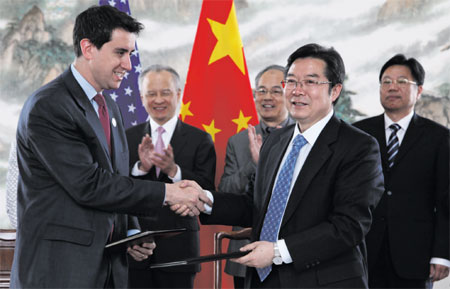US, China schools join hands
|
Evan Glazer (left), principal of Thomas Jefferson High School for Science and Technology, shakes hands with Wang Dianjun (second from right), principal of Tshinghua High School, after signing a partnership agreement in Washington. Cui Tiankai (second from left), China's ambassador to the US, and Fang Maotian (third from right), minister counselor for educational affairs, and Shi Ping (right), vice-president of Tsinghua High School, watched the signing ceremony. Cai Chunying / China Daily |
The signing ceremony for a knowledge exchange between Tsinghua University's high school and Thomas Jefferson High School for Science and Technology was accomplished Saturday at the Embassy of the People's Republic of China in Washington.
Thomas Jefferson principal Evan Glazer said the collaboration areas will depend on students' interests, including culture and science and technology. "There are a lot of opportunities to collaborate and research," Glazer said. " Our school's emphasis is on helping students develop projects and collaboration with professionals."
Glazer said he believed the academic collaboration would bring mutual benefits.
Tsinghua High School principal Dianjun Wang said the two schools' students would collaborate on research projects. In the Chinese educational system, students are encouraged to study for exams, and laboratory operations usually revolve around empirical and theoretical practice, the administrator said.
The Chinese students could benefit from the creative thinking and explorative research promoted by the US school, he said.
"We will have in-depth cooperation on student activity, faculty interaction and course design," Wang said. "Chinese students will enrich their horizon by understanding what their US peers are thinking and exploring."
Wang said the emphasis in education has shifted from a school cultivating its own students to a country cultivating a new generation, and even to a world cultivating a new generation in a united way. "We should open a door to let young generations exchange and cooperate early," the principal said.
Glazer said that even with the differences between the US and the Chinese education systems - China's being centralized, the US's specialized -"we try to learn from each other and find what works for each of us."
Thomas Jefferson has collaborated with various schools. In October 2012, it held an exchange program with Zhengzhou No. 2 Middle School from Henan province. US students also have had academic exchanges with the high school affiliated with Beijing's Renmin University of China.
Tsinghua University's high school ranked No. 11 last year among China's 260 best high schools, according to China Research Group, a non-profit Washington-based think tank. Thomas Jefferson ranked fourth in a US News survey of
more than 21,000 public high schools in 49 states and the District of Columbia, based on state proficiency standards and how well students are prepared for college.
The schools' collaboration underscores the role that high schools are playing in the evolving US-China dialogue. For years, US-China collaboration on education in the world's most populous country was on the college and university level. Starting this fall it will trickle down to high school as the first Sino-US high school in China prepares to open in Shanghai.
The Dwight School in New York and the Shanghai Qibao High School have formed the Shanghai Qibao Dwight High School and are processing admission applications for their inaugural class. The private school is looking to enroll 100 students from Shanghai and 50 from other Chinese cities. The school's capacity is about 1,000 students in three grades. Tuition, awaiting government approval, will be approximately 120,000 to 150,000 yuan ($19,000 to $24,000) a year.
The school is the product of discussions that started about two years ago when the Shanghai education commission was looking for schools in the US to collaborate with on a public high school in Shanghai. Brantley Turner, who was director of programs for Dwight School in China, suggested that the Dwight School, a New York-based college-preparatory school that offers the International Baccalaureate (IB) program, would be a good fit.
Discussions led to senior administrators from Qibao and the minister of education of the Minhang District, where Qibao is located, coming to New York to sign a letter of friendship, and by December 2012 the schools had signed a memorandum of understanding to cooperate, and it was approved by the Ministry of Education.
"I think the partnership sort of points to the overall reform of education in China," Turner said in an interview. "The very simple answer is, NYU Shanghai got approved and set up. The education commission thought they should be moving to the high school direction."
There is a large demand in China for the international curriculum that is different from the Chinese system that pegs advancement to test results, Turner said. While some international schools in China offer a more global curriculum, they generally don't accept Chinese nationals and are for students of other citizenships and backgrounds, she said.
Dwight's curriculum is based on the IB program, which was founded in the 1960s and emphasizes learning through language study, focusing on current global affairs and reading international literature. Only a little more than a dozen schools in New York offer the IB diploma.
"NYU is grafting an NYU curriculum [with the creation of NYU Shanghai], but what we're doing is collaborating and creating a Chinese-integrated curriculum with the international baccalaureate curriculum, so this is creating something totally different and new," Stephen Spahn, chancellor of the Dwight School, told China Daily.
"The government has been involved up to a point in international education for Chinese nationals, but it hasn't set down a really clear set of guidelines on what schools would need to deliver should they need to implement an international curriculum," Turner said. "So through our school and the policies that have been set up around our school, China is moving in this general direction. Shanghai is a first-mover in this space and I think NYU points to that."
Contact the writers at changliu@chinadailyusa.com and amyhe@chinadailyusa.com



















